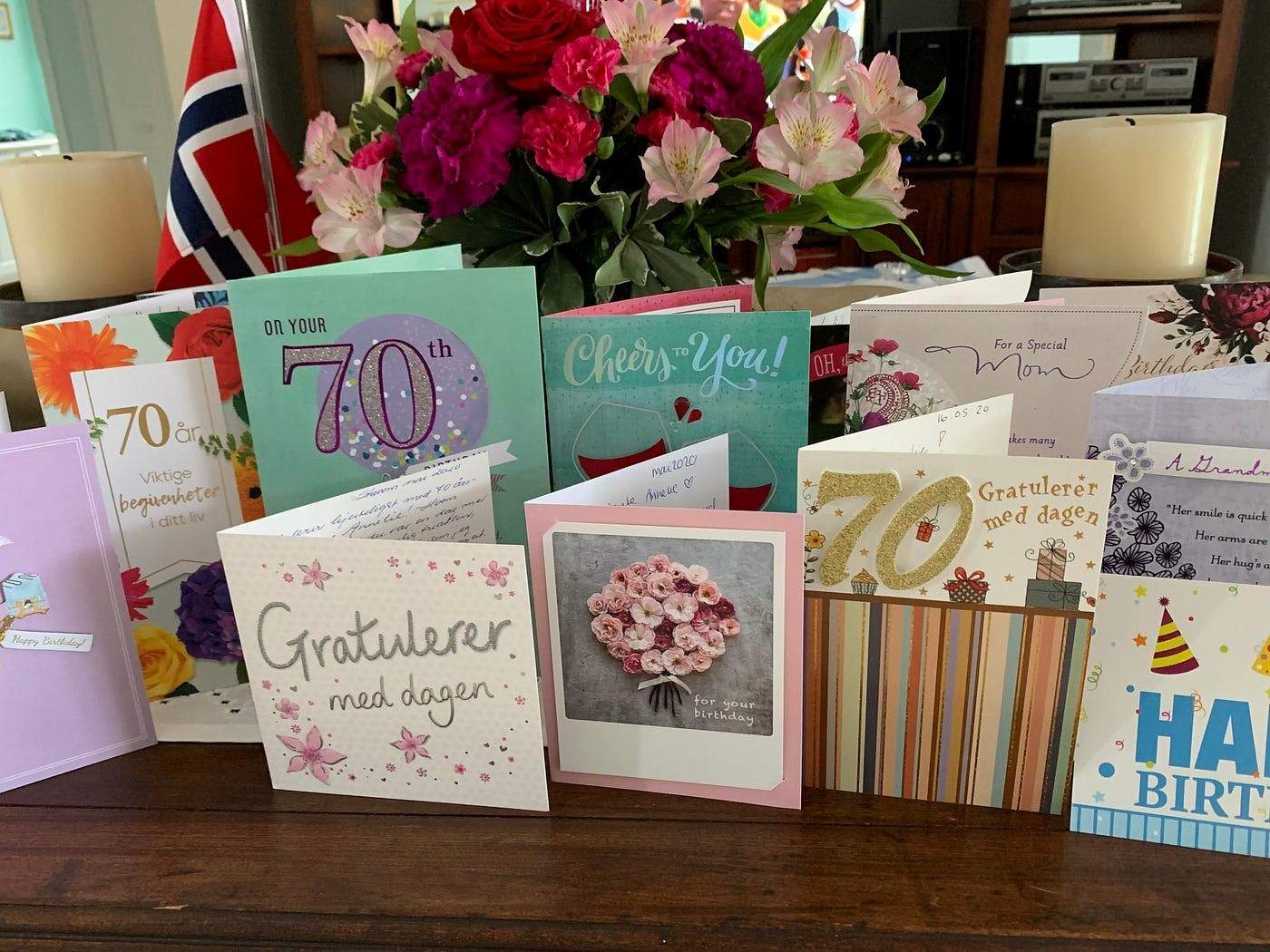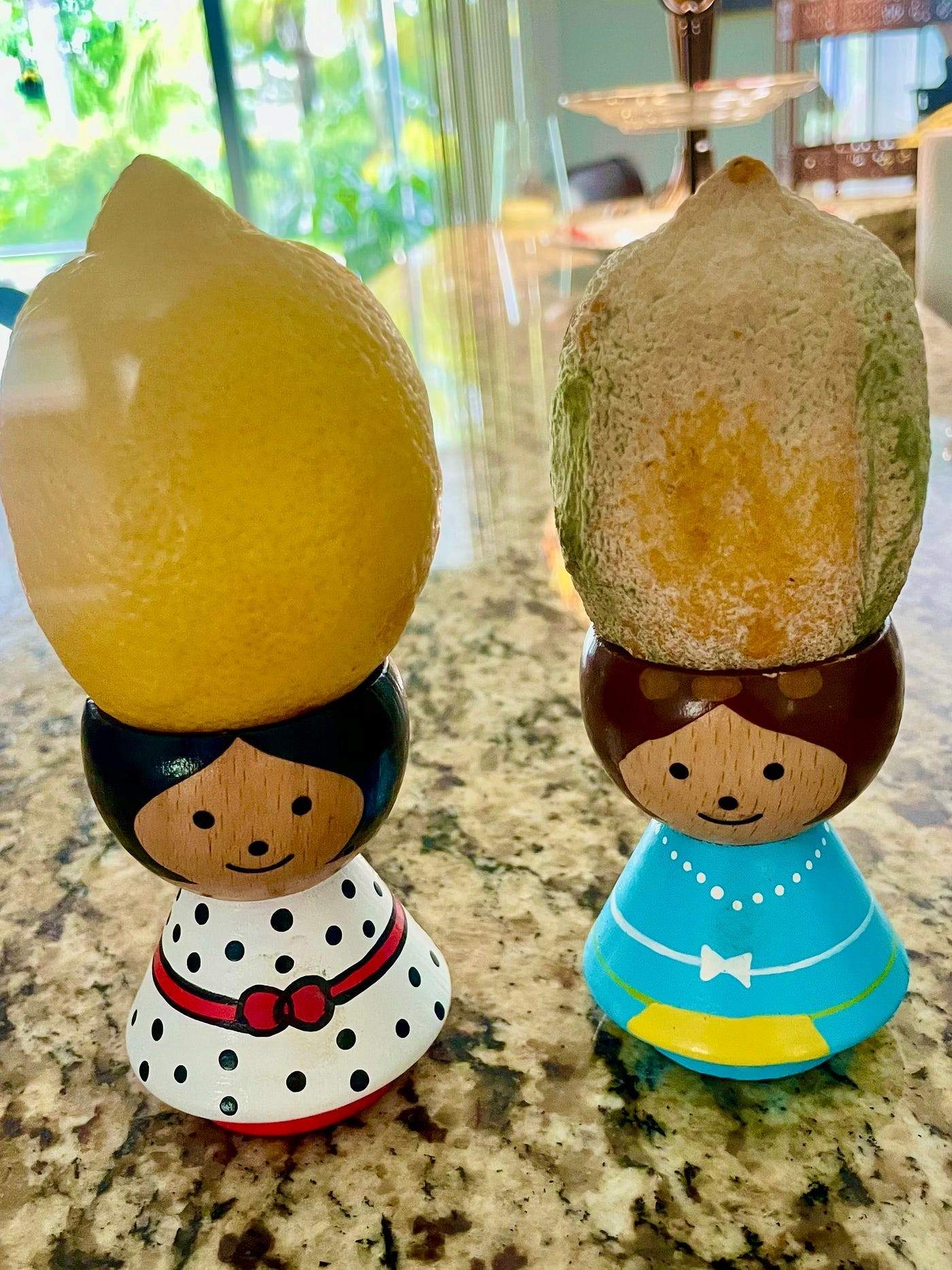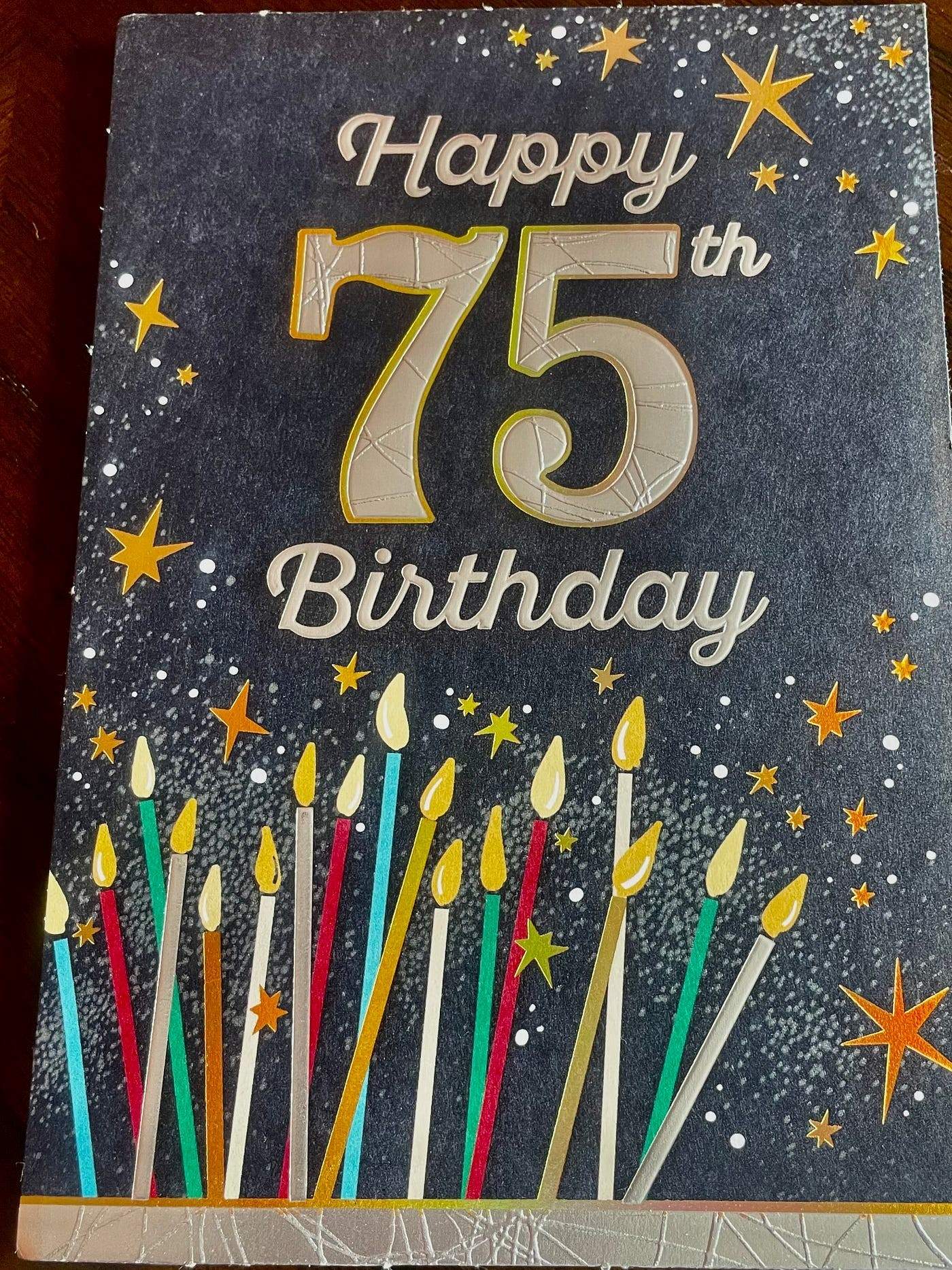Shake Off Your Shackles Boomers
Monday, September 15, 2025
A powerful tool to embrace, celebrate, and empower our best age now
“You have brains in your head. You have feet in your shoes. You can steer yourself, in any direction you choose”. — Dr Seuss
When I turned 70, I was still wearing emotional shackles. I had brains in my head, and I had feet in my shoes, but I did not steer myself in the direction of my choice. The shackles holding me back were heavy from shame. Shame from how I viewed myself and shame from fear of what some people might think about me.
Less than a year after the big seven O, I started shaking those shackles. Little by little, using one remarkable tool, I began to free myself. I started moving in the direction of my dreams, choosing inner peace over external judgement.

In 2020; at the height of the Pandemic, I celebrated my 70 birthday. All the guests were cards. Photo by Annelie.
Growing older is not a choice. It is reserved for the lucky ones. Yet, on the wings of time, nothing stays the same. Today we are one day older than we were yesterday, but we are one day younger than we will be tomorrow. If you have something undone that you've always wanted to do but never did, now is the time to get it done.
The time is now because never again will we be as young as we are today
Being clear about what we want is the first step in moving towards our dream. Aligning authentic values with informed choices is the baseline for living with autonomy. It is the most essential tool in the shed. It can help us combat internalized ageism, self-defeating beliefs, and provide us with unbelievable benefits when we know how to use it. Exercising autonomy can help us dance to the beat of our own drums, without fear of what the critics have to say. That is, if we let go of the shackles that hold us back.
Shackles were evident in my middle years, hurting my family. At my son’s prom, we were getting ready to watch him, his date, and his friends posing for pictures and driving in their limousines. My 16-year-old daughter was wearing her favorite shirt. In the rush to get us out the door, I told her to change the shirt that had a stain on it. She refused. I gave her an ultimatum: change the shirt or stay home. She stayed home. Shackles come in different sizes, shapes, and forms. Dysfunctional childhoods, financial dependency, unhealthy relationships, and mental disorders are some reasons.
I robbed my daughter of a once in a lifetime precious experience, based on my own fear of other people’s judgement about the stained shirt. My shackle was based on low self-belief and shame. It was a far cry from autonomy.
Having Autonomy is the capacity and the freedom to make our own choices and decisions, from a place of authenticity. From the cradle to the grave, we struggle to assert our independence in order to get what we want. Watching toddlers screaming and throwing tantrums at the supermarket is often a beginning sign of autonomy. Watching an angry old woman fighting with her adult daughter to wear an old, familiar shirt, rather than a new shirt of the daughter’s choice, is often the dwindling end of autonomy.
Most baby boomers, and our older sisters and brothers, value independence and the ability to make our own decisions. This is crucial for maintaining dignity and a sense of control in our lives. But here is the thing: more often than not, our choices are not based on what we truly want. They are often not made with an open, free, and conscious mind.
Rather, many choices are based on impressions made from deep-seated memories, emotions, habits, and experiences collected throughout our life span. These experiences have imprinted themselves on our subconscious mind, which operates outside of our conscious awareness.
This puts the brain on autopilot and creates shackles that tie us down. That is, until suddenly an impression from that vast, unconscious memory bank floats to the surface of awareness, and we have a breakthrough moment.
My breakthrough moment happened at 4:00 am, while I was sitting on a toilet seat in a hotel in St. Augustine, Florida.
With the door closed, not to disturb my sleeping family members, I sat on the cover of a toilet seat, writing index cards. Two years prior, I was admitted into an online Master of Science program at the University of Florida (UF) to study health and human behavior.
Since a young adult, I knew I had a mission to teach health and prevention of cardiovascular disease (CVD), the leading cause of death globally. The studies at UF would further prepare me for that mission.
It was a no-brainer. Knowing that my father died from a heart attack at age 41 and my mother later suffered a debilitating stroke, CVD is my thing.
Against the backdrop of a 30-year nursing practice, certifications, nursing excellence awards, and other accolades, I was the poster girl for a lifelong learner. Writing index cards was how I studied for an upcoming exam, preparing myself for the thing in the process.
Suddenly, it dawned on me that I did not have to do this. I was tired. I was tired of studying, tired of living with performance anxiety, and I was tired of spending tons of money on a degree that I might not even live long enough to receive.
Mostly, I was tired of feeling that I was not enough.
“ Annelie, why are you doing this?” I asked myself. This breakthrough question was followed by another, “At 70 years of age, why are you freakin doing this?”
A slight motion in my shackles was initiated.
Still, I finished the job. I bundled the index cards with a rubber band and joined my family for breakfast.
Somehow, I have been burdened by shame. Shame is a complex emotion that is evoked when we feel different from others, or we feel as if we do not measure up to peers and social expectations.
During the years before 10, my family made room for my imaginary friend, at the dinner table and on the bus. My parents congratulated me with smiles and cheers when I sang on the stage in an amusement park. Despite the host telling me “thank you” and “that’s enough”, I refused to get off the stage until I had sung multiple verses of a very long and very sad song about a dying horse.
How did I unconsciously label the memory of roaring laughter in my young mind?
The first time I remember experiencing a feeling of shame was in elementary school, while growing up in Norway. I must have been around 11. I was laughing so hard that the teacher told me to leave the classroom. She said that my laughter was disturbing. “Go out in the hallway and continue to laugh there”, she said.
I remember standing in that hallway by myself, looking down. I saw my lower legs and the feet in my brown shoes. That morning, I had put on my mom’s nylon stockings, wanting to be cool. Standing alone in the hallway, looking down at those nylon stockings, a heavy feeling brushed over me. Nothing was funny, and nothing was cool. I felt alienated; I felt shame.
The same teacher often read my essays aloud in class. “So, class, what grade should we give Annelie for this story?”, she asked. “Give her an A, the students said. “No, I don’t think so, maybe a B, for her scattered errors”, she said.
Things did not improve after I dropped out of high school at 17; that had a profound impact on me. Now I was separated from my twin sister. She continued to move up, while I moved out. I carried that shame so deep that I did not even share it with the man I later married.
Thank heaven for adult education and Highschool Equivalency DiplomaOpens new window. (GED). At age 23, living in the US, I passed the GED. My first child was an infant at the time. Pumping breast milk with a small plastic hand pump in the old bathroom at Central Commercial High School in Manhattan, I remember feeling elated. I was feeling elated at the prospect of earning a ticket. The ticket to start an educational journey and fill the self-created void of shame.
Because we, ourselves, attach meaning and labels to events and memories, we can remove them. Having autonomy, we are free to change our thoughts. We can relabel memories and events to serve us better.
We don’t have to think the same thoughts as we did yesterday, especially if they don’t work in our favor. This report informs us that the average person has about 60.000 thoughts per day. 75% of these thoughts are negative, and 95% are repetitive.
Think about that for a moment.
Although the number of thoughts going through our heads is difficult to measure correctly, the significance of the numbers is mind-blowing, and certain to hold some truth.
This story, by Medium writer
, is well-written and worth much more than the four minutes it takes to read. It can transform your entire thinking process, if you let it.
In his story, Andy writes about how we can maximize the potential of our thoughts to serve us better. Knowing that body and mind are connected by the bridge of our thoughts, here are some of his suggestions.
- Positive affirmations
- Eating a healthy diet
- Meditation
- Exercise
- Sleeping well
With autonomy at our disposal, we can choose as we damn well please

Photo by Annelie
“Watch your thoughts, they become your words; watch your words, they become your actions; watch your actions, they become habits; watch your habits, they become your character; watch your character, it becomes your destiny.”
— Lao Tzu
Make no mistake; as sick as we may be of hearing the word health, physical health is the cornerstone of autonomy. If you have capacity for autonomy, you have the capacity to figure out what needs to be done in order to keep your body moving at optimal level. Because we function at different levels on a continuum, the keyword here is optimal; doing our deeds with awareness and our best effort, despite personal limitations.
Autonomy supports health in the life of our future self
This study answers an interesting question that applies to boomers and our older sisters and brothers alike. “What characteristics of urban, non-institutionalized elders predict which individuals are most likely to remain independent of personal assistance during a two-year observation period?”
They used a method of a population-based sample of 602 non-institutionalized urban residents, age 70 and older, who were followed for two years. After two years of observation, the result showed that 98 of the 487 survivors remained independent.
Some of the factors associated with continued independence were attributed to those who were younger (closer to 70), had fewer medical conditions, and did not smoke. Having a baseline attitude of favoring personal independence also made a positive difference.
Attitude is the ultimate bonus of autonomy; it forms our thoughts into behavior
“Everything can be taken from man except the last of the human freedoms, his ability to choose his own attitude in any given set of circumstances-to choose his own way.” — Victor Frankl
With a brand-new attitude, I started shaking off my shackles
It so happened that all six of the family members I travelled with to St. Augustine became infected with COVID-19. My three grandchildren experienced mild symptoms, but the three adults were hit hard. They were bedridden for weeks. I did not get sick.
I knew that the courses I took at UF served my knowledge base, but the degree itself did not. I contacted my professor, put the studies on hold, and became a full-time caregiver. Between making soups and bringing medical supplies, I sent a gratitude note to the Universe for having my back.
I felt gloriously free. I felt whole; I was enough.
Free to function at large without the burden of having to study. I felt free to be me, without attachments. Suddenly, I had more time. I discovered Medium. From writers on Medium, coming from all corners of the world, I read powerful, brave, and authentic stories.
I learned that we are only as sick as our unresolved secrets. No matter who we are or where we come from, adopting an attitude of embracing and celebrating our stories, as is, is a testament to autonomy. I began writing on Medium.
Little by little, writing with truth, the shackles came off
“The greatest discovery of all time is that a person can change his future by merely changing his attitude.”
— Oprah Winfrey

Based on my Norwegian background, nursing experience, meditation practice, and a relentless desire to help my age-mates, I dove into my dream. I wrote stories about my thing: health literacy, wins and losses, personal growth, and prevention of CVD. Living with autonomy; choosing growth with free will over fear, and without fear of failure has been my best tool for optimizing the aging process.
A few months ago, I celebrated my 75th. birthday. I gave myself a gift that I want to share with my age-mates. I selected 60 of the best stories that I have published on Medium. On Amazon, I created a series of four books with 15 stories in each. I honored the mission born in my young self a long time ago.
With autonomy in our back pocket, we can send shackles to the moon. We can embrace and celebrate our best age, today.
Thank you.
If you are over age 65 and want to learn about health literacy and personal growth, go to www.northboundspry.com. A Northbound Spry is a person over 65 who has enough gas left in the tank to seek goals that make them strong, healthy, and happy.
My book, Say Yes To A Better Life, is available on Amazon.
Sign up here to receive our free weekly newsletter featuring the best of Crow’s Feet.
Published in Crow’s Feet: Life As We Age
“The longer I live, the more beautiful life becomes.” (Frank Lloyd Wright) Non-fiction pieces, personal essays and occasional poems that explore how we feel about how we age and offer tips for getting the most out of life.
Thank you ♥️
. . .
Annelie Holmene Pelaez believes that everyone has an attribute to share with others. Promoting cardiovascular health and helping adults over age 65 is her contribution. When we don’t let age define us, but rather empower us to grow, we discover health and happiness are byproducts of who we are.
Annelie is the author of the book, Say Yes to A Better Life, available at Amazon.
Sign up for our newsletter and a free PDF designed specifically for Boomer Girls.
Some of the links on this website are affiliate links, which means I may earn a small commission if you make a purchase through these links, at no extra cost to you. I only recommend products and services that I believe in and think will add value to my readers. Your support by using these links helps to keep the site running and allows me to continue offering helpful content.






